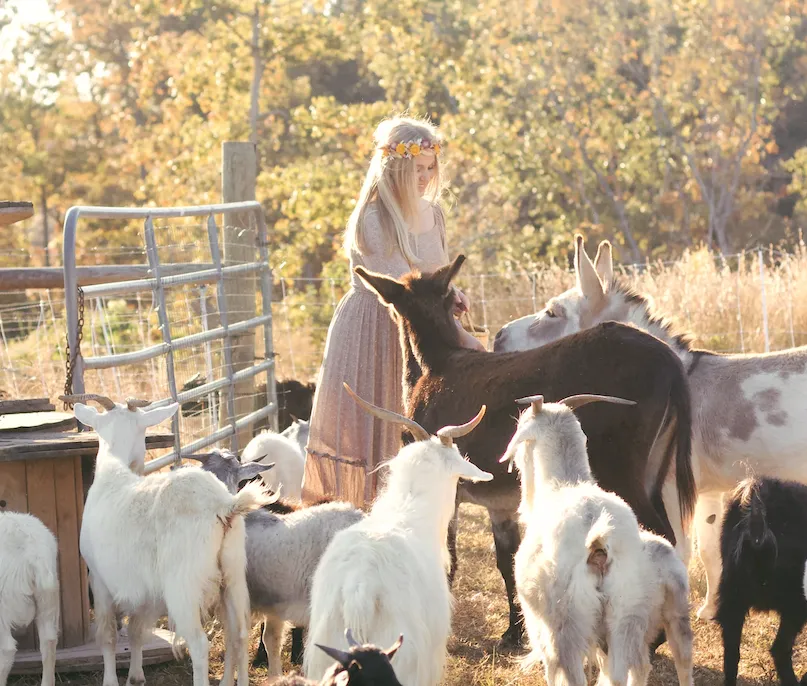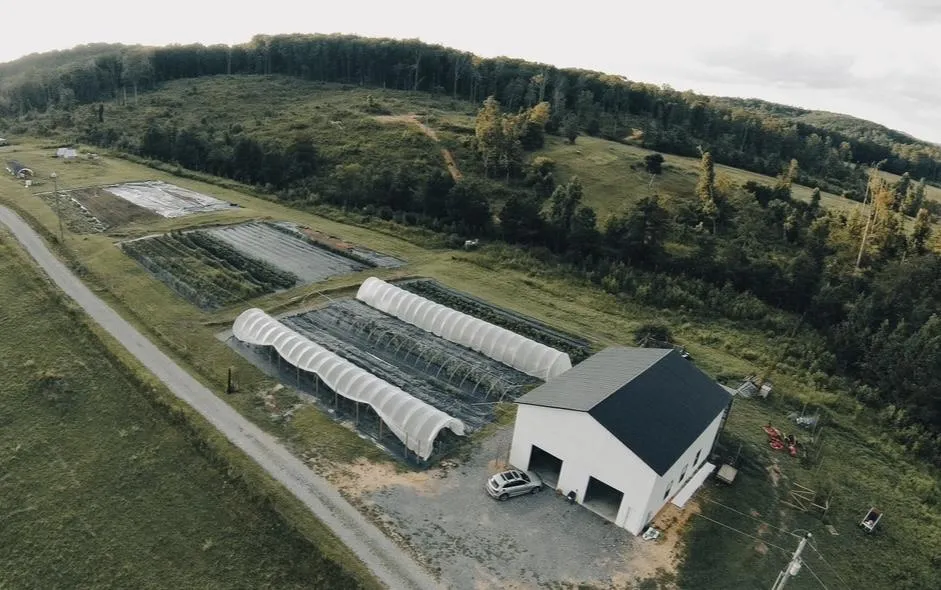The Matts Family Blog
Sharing seasonal recipes, homesteading tips, tricks and stories to brighten your day and give you a glimpse into life at Sunny Hill Farm.

My Top 5 Tips for Raising Happy & Healthy Goats in the Winter Months
“Raising goats in the winter presents its challenges, but with the right knowledge and preparation, you can ensure your goats remain healthy and happy throughout the colder months.” - Lauren Matts
My Top 5 Tips for Raising Happy & Healthy Goats in the Winter Months:
Raising goats in the winter requires careful planning and attention to detail to ensure your herd remains healthy, strong and comfortable during the colder months. While goats are hardy animals, they can be susceptible to the challenges of winter weather and more prone to disease during the colder months. I am going to give you my top tips for shelter solutions, strategies for keeping your goats warm without heat lamps, ways to prevent common illnesses, and how to ensure proper nutrition for your goats during the winter. Additionally, I am going to share helpful tips for kidding in the winter, which presents its own unique challenges.

1. Shelter Tips for Keeping Goats Warm and Dry
Winters can be chilly and damp, so providing adequate shelter is crucial for your goats' well-being. Here are my top four tips for keeping your goats warm in the winter:
a. Well-Insulated Shelter: Consider adding or retrofitting your barn, shed or animal shelter with proper insulation. Insulated walls and a solid roof will help regulate the temperature and reduce drafts which ensures your herd has a warm and dry place to go.
b. Adequate Ventilation: While insulation is essential, proper ventilation is equally important. Good airflow helps remove moisture and prevents respiratory issues. Install vents near the roof to allow moist air to escape while keeping the lower portion of your shelter draft-free.
c. Dry Flooring: Cold and wet ground can lead to frostbite and other health issues and diseases. Provide a dry and comfortable flooring in your shelter, using materials like straw, wood shavings, or rubber mats. Change out the straw or bedding as needed to prevent sickness from an unsanitary living environment (this will probably be where your goats will huddle and sleep together, so it is important that the bedding gets changed regularly depending on how large your herd is).
d. Windbreaks: If you have open pasture, consider creating windbreaks with natural barriers like trees, shrubs, or man-made structures. These will shield your goats from biting winds. We cut openings in IBC totes for our goats to have for shelter out in the pasture in case a cold wind or rain blows in when they are far from their main shelter.
2. Keeping the Shelter Warm without Heating Lamps
Using heating lamps in a shelter or barn can be risky due to the fire hazards they present. Instead, try these safer alternatives to keep your goats warm:
a. Deep Bedding: Deep bedding, which consists of layering straw or hay, can create natural insulation for your shelter. As goats move about, they mix the bedding, generating heat. You'll need to regularly change and add fresh bedding to maintain cleanliness and warmth.
b. Cozy Goat Coats: If you live in a particularly cold climate, it may be beneficial to invest in high-quality goat coats made of waterproof and insulated materials. These coats can help your goats retain body heat and stay dry in cold, wet weather. In zone 7b, we don’t typically need to use goat coats, but it is smart to have them on hand in case extreme weather conditions arise.
c. Group Huddling: Goats are social animals and will huddle together to conserve heat. Ensure there is enough space in their shelter for them to all gather and cuddle during extremely cold nights.
3. Preventing Illnesses
Preventing illnesses like Goat-Pox, Pneumonia, & Q-Fever is very crucial during the winter months. Here are some steps to minimize the risk of diseases.

a. Quarantine New Arrivals: If you introduce new goats to your herd during the winter, quarantine them for a few weeks to prevent the spread of diseases. Watch for signs of illness, such as coughing, sneezing, or changes in behavior.
b. Hygiene: Maintain good hygiene practices by regularly cleaning and disinfecting their shelter and equipment. Clean water and feed containers frequently to prevent the growth of harmful bacteria.
c. Add supplements and minerals into their diet to improve health and prevent sickness. We get into this next!
4. Supplements and Minerals for Winter Health
Goats require specific supplements and minerals to stay healthy during the winter months. Here's what you should consider:
a. Adequate Nutrition: In the winter, forage quality may decline, so ensure that your goats have access to good-quality hay and possibly some grain to maintain their body condition. Adjust their diet based on their energy and nutritional needs.
b. Mineral Supplements: Provide mineral supplements suitable for goats, particularly those that contain calcium, phosphorus, and selenium. Selenium deficiency is common and can lead to various health issues. A couple things we always have available for our herd: Salt blocks and bags of “Manna Pro Goat Mineral” to add to their diet. We mix goat minerals in with their sweet feed/treats to make sure they actually consume it.
c. Vitamin D: Ensure your goats have access to natural sunlight or provide a vitamin D supplement, as winter days are shorter, and goats require this vitamin for calcium absorption. This is why it is important to have a couple smaller shelters/windbreaks out in their pasture so they still have the ability to graze in the sunlight while having the option to take shelter if needed.

5. Preparation and Kidding in the Winter
Kidding in the winter can be challenging, but with careful planning, you can ensure successful births:
a. Separation: Consider separating pregnant does from the main herd a few weeks before kidding to monitor their health and provide individual care.
b. Adequate Shelter & Cleanliness: Ensure that the kidding area is well-insulated and draft-free. Use deep bedding to keep the kids warm. Make sure to clean their shelter frequently and add fresh bedding frequently to prevent the goat kids from getting coccidiosis.
c. Extra Nutrition: Pregnant and lactating does need extra nutrition during the winter. Adjust their diet to meet their increased energy requirements. Watch your deos to make sure they are letting their kids have enough milk. Supplement with bottle feeding if needed.
d. Monitor Kids: Keep a close eye on newborn kids, as they are more vulnerable to cold temperatures. Provide additional bedding and supplemental heat if necessary. Check on them multiple times a day to make sure they are acting normal, they are eating enough and to watch for any signs of illnesses that can be more susceptible in the colder months.
Recap:
Raising goats in the winter presents its challenges, but with the right knowledge and preparation, you can ensure your goats remain healthy and happy throughout the colder months. Adequate shelter, safe heating, proper nutrition, and disease prevention are key factors in keeping your goats thriving during the winter. By implementing these tips, you can provide your goats with the care they need to flourish in the wintertime, ensuring their well-being and your peace of mind. To learn more about raising goats, homesteading tips & country living follow me on Instagram @TheMattsFamily.

Why Country Living?
Living in the city, we were surrounded by convenience. But with that came noise, pollution, and an often superficial connection to our surroundings. As time passed, we felt an ever-growing yearning to get back to our roots, quite literally. At first, the craving started with...
Hire Our Marketing Team
We are a husband and wife duo that take homesteading and farming brands to the next level! We not only have over 10 years of online marketing experience but we're living the dream out on our 37 acre farm in the beautiful Appalachian Mountains. Prominent Marketing is stacked with a talented team and has a proven track record for success in working with brands and implementing their famous "Rural Reach Triangle Method".

